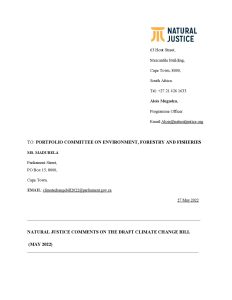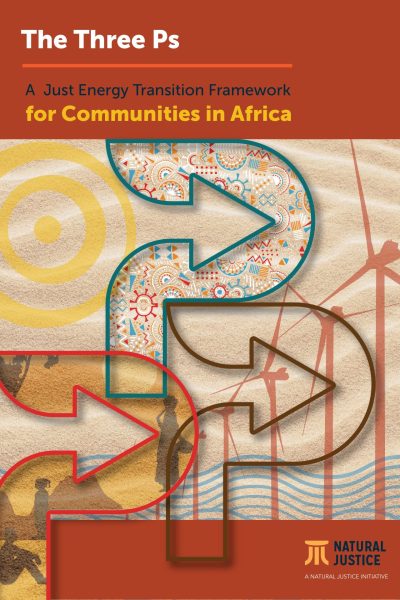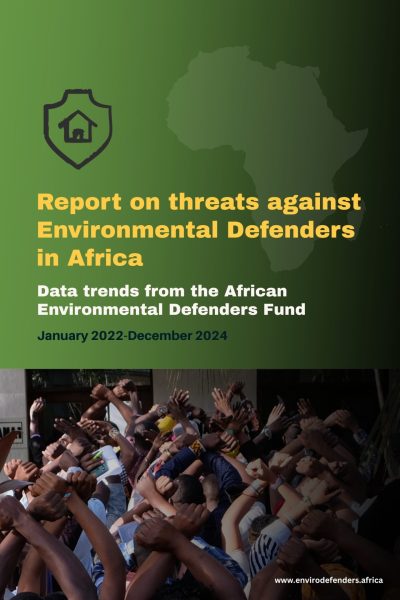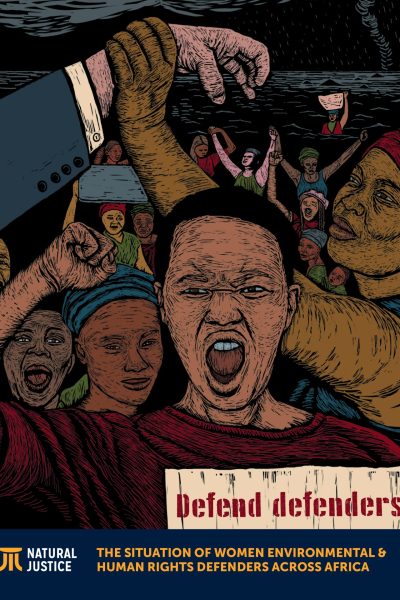We are deeply concerned that the Bill falls far short of addressing the urgency of the climate crisis.
The following concerns arise:
LACK OF URGENCY: The Bill fails to reflect the urgency of the climate crisis and its impacts on South Africans. The Bill includes unreasonably long timeframes for implementation of various provisions and/or omits time frames altogether. The Act must set urgent timeframes for South Africa to meet the deadlines for international climate obligations.
EMISSION REDUCTION LIMITS: The Climate Change Act will not be effective unless it includes ambitious emissions reduction targets. The Bill makes no reference to the Paris Agreement targets of 1.5°C and 2°C respectively. While government officials claim that South Africa is working toward “net-zero” emissions, the Bill fails to indicate a concrete plan of action to achieve this goal.
CONSTITUTIONAL RIGHTS: Climate change has devastating impacts on the realization of human and constitutional rights. These rights are guaranteed in the South African Constitution and Bill of Rights: rights to life, dignity, access to food and water, and to an environment not harmful to health or well-being. All of these will be impacted by the climate crisis. The Bill should affirmatively recognize the government’s responsibility to take strong action on climate change to protect the realization of these Constitutional Rights.
TRANSPARENCY AND ACCESS TO INFORMATION: The Bill is weak or silent on fundamental transparency and access to information on climate change. The Bill must be amended to provide for automatic public access to all climate change information and records provided for in the Bill. The Bill should make express provision for data and reports generated under provisions of the Bill to be available online.
PUBLIC CONSULTATION AND PARTICIPATION IN THE PROMULGATION OF THE BILL: The public commenting period for this Bill was insufficient to enable meaningful engagement by all sectors of society. More effort should have been expended to ensure effective public participation, particularly in respect of assisting low income and rural communities to participate, many of whom are susceptible to climate change.
FOREST PROTECTION AND RESTORATION: The Bill does not recognize forest protection and restoration as a nature-based solution to climate change. Forests play a huge part in reducing carbon emissions. The Bill should be amended to include reference to nature-based solutions to climate change as effective, low-cost climate mitigation and adaptation measures.
SANCTIONS AND PENALTIES: The Bill should include stronger enforcement and compliance measures to deter companies and individuals from shirking their emissions reduction obligations.
IMPLEMENTATION AND CO-OPERATIVE GOVERNANCE: The Bill is weak on training and funding local, provincial, and national government bodies to implement effective climate response measures. The Bill places a large burden on municipalities, provinces, and ministerial departments, without making adequate provision for capacity-building and funding. Financial support, and capacity-building are fundamental to the implementation of the Climate Change Act yet are entirely absent from the Bill as currently drafted.
MAINSTREAMING CLIMATE CHANGE MITIGATION AND ADAPTATION: The Bill does not adequately require the mainstreaming climate change mitigation and adaptation in all government decision-making. Effective climate change action requires a whole-of-government approach. The Bill does not adequately provide for well-coordinated climate response across all government bodies at all levels.
LIMITED SCOPE: The current scope of the Bill must be expanded to facilitate a just transition to renewable energy sources and ensure that South Africa meets its emissions targets. The Bill must also reduce communities’ climate vulnerability by including climate adaptation provisions which protect environmental and human security. Furthermore, the Bill does not properly situate the legislation in the context of international law and policy, and there is inadequate discussion of whether and how the Bill will allow South Africa to meet its international climate obligations.
PLANNING: The Climate Change Bill lacks ambition and fails to provide a clear plan for emission reductions and climate adaptation measures. The Bill must provide clear boundaries and mandates to ensure that such regulations will provide more meaningful emissions reductions and lead to adequate climate adaptation action.
JUST ENERGY TRANSITION (JET): South Africa’s development path has not only been one of prevalent poverty, inequality, and unemployment, but also one of high carbon emissions. The country is one of the top 15 CO2 emitters in the world and the largest in Africa. For South Africa to comply with its commitment to the Paris Agreement, it would need to phase out coal, gas, and oil from the power and liquid fuels as soon as possible. Therefore, we need to phase-out and eliminate the use of fossil fuels for energy. The Climate Change Bill must incentivise and enable a just transition from climate-harming to clean energy and ensure that no-one gets left behind.







